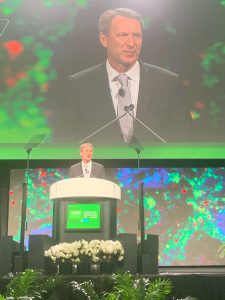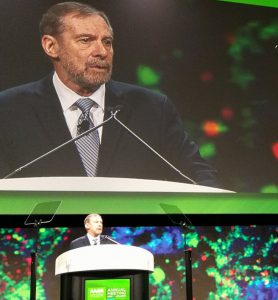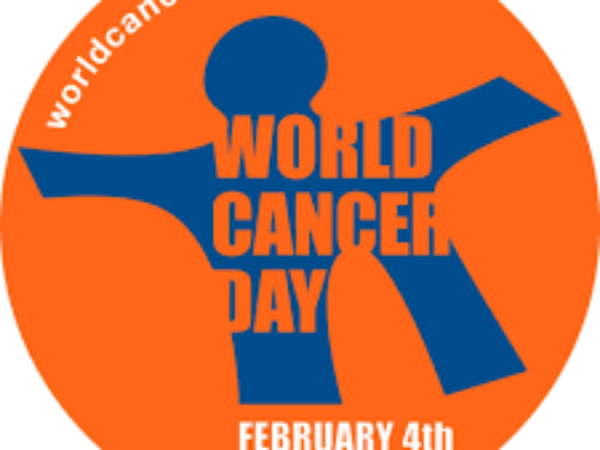AACR Annual Meeting 2019: NCI Leaders Praise Progress and Collaboration
Two of the nation’s preeminent leaders in cancer research and policy took the stage Sunday morning at the Opening Ceremony of the American Association for Cancer Research Annual Meeting 2019.
Norman “Ned” Sharpless, MD, FAACR, and Douglas R. Lowy, MD, FAACR, discussed recent progress against cancer from the vantage point of the National Cancer Institute (NCI). Sharpless has served as director of the NCI since October 2017, and will soon leave the agency to become acting commissioner of the U.S. Food and Drug Administration (FDA). Lowy will take over as NCI acting director, a position he held from 2015-2017.
Sharpless and Lowy discussed the rapid pace of progress in cancer care, drug development, clinical trials, and research funding over the past few years, and vowed to continue the momentum in their new roles in Washington, D.C.
A look back with Dr. Sharpless …
“Each time I attend the AACR Annual Meeting, I compare the progress to years past—and I am reminded of the ‘bad old days’ of oncology care—a time when we had so little to offer our patients, when we had so little hope against aggressive cancers. But the tremendous progress we have made in the past few years is amazing,” Sharpless said.
“As a long-time cancer doctor, I find it really satisfying to note this progress. It is good news. But those of us working in this field today can’t take all the credit for this good news.”
Sharpless noted an old proverb: “We drink from wells we did not dig. We are warmed by fires we did not build.” Modern advances in cancer care and prevention are similarly based on research that began decades ago, and to ensure continued progress, we must honor the tenets of basic research while channeling them into future efforts, he said.
Sharpless praised the scientific advances that have led to decreasing cancer mortality since the 1990s. He said because of progress in early detection, screening, therapy, and prevention, the NCI predicts these strong declines in mortality will continue for many years to come.
Progress has been fueled by the increased pace of drug approvals by the FDA, Sharpless said, promising the crowd that he will continue to work for efficient approvals of cancer drugs when he takes over leadership of the FDA.
Sharpless praised the growing diversity of the scientific workforce, using AACR membership as an example. AACR membership has risen by 20 percent, the number of women in the AACR is up by 30 percent, and the number of minority members is up 35 percent since 2015. This trend indicates tremendous potential for the future of cancer research, Sharpless said.
This growing pool of energetic young researchers needs consistent funding support, making it crucial that the NCI and the National Institutes of Health receive robust federal funding, he said. Recent NCI innovations in the grant process, such as extending grant periods to cut down on administrative duties and preserving paylines for early-career scientists, are among numerous initiatives aimed at ensuring the scientific workforce remains strong.
“The people, passion, and sense of mission at the NCI are spectacular, and I will miss the science and the excitement that permeates the NCI. And I will still be an oncologist when I get to FDA. And of course, I will not be giving up my AACR membership,” Sharpless noted.
… And a look ahead with Dr. Lowy
Lowy thanked Sharpless for his dynamic leadership and said he looks forward to working with him as they lead the NCI and the FDA.
Lowy told the audience that the number of grant applications sent to the NCI has grown significantly – about 50 percent since 2013. He said this indicates a strong flow of innovative ideas, however, the increased demand for grants is unlikely to be met by an NCI budget that has grown at a more modest rate.
“The truism that we always run out of funds before we run out of promising research ideas is even more valid today than in the past,” Lowy said.
Lowy played an important role in developing the National Cancer Moonshot Initiative that has set ambitious goals for cancer research and created some new funding mechanisms. However, increased competition for funding means that the overall budget for the NCI must also continue to grow, he said.
Lowy pointed out that President Trump announced in his State of the Union address that his budget proposal would ask Congress for $500 million over the next 10 years to fund research for children’s cancer. He said it will take a collaborative spirit to make the most of such funding opportunities, and to extend the benefit of research beyond individual institutions and on to successful treatments that are available for all.
“When we break down siloes and truly cooperate, we, as a community, can learn from every child,” he said.
Lowy said he looks forward to the policy sessions and research presentations taking place in Atlanta this week, and he views the AACR Annual Meeting as a way to foster the collaboration that is essential to future progress.
“The AACR meeting is a great opportunity to learn new things, to make new connections, as we build on previous discoveries. It can also be an opportunity for each of us to chart or refine the course by which we plan to contribute to the progress that we know lies ahead,” Lowy said.
“This week, let us all discover some new truths. Let us endeavor to drink from wells we did not dig. Let us warm ourselves by fires we did not build.”





